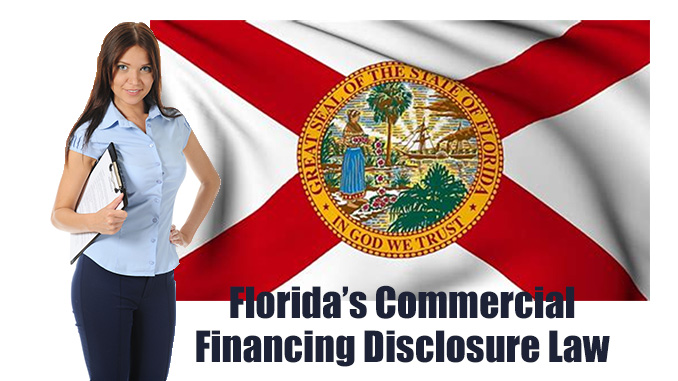
January 1st, the State of Florida will begin to require that factoring brokers and consultants disclose their actual address and phone number in advertisements that promote their services as a broker / consultant. Florida’s CFDL Florida Commercial Financing Disclosure Law, imposes several requirements on providers of commercial financing and brokers of such transactions. It defines a provider as:
- as any “person who consummates more than five commercial financing transactions with a business located in [Florida] in any calendar year.”
- also includes “a person who enters into a written agreement with a depository institution to arrange a commercial financing transaction between the depository institution and a business via an online lending platform administered by the person.
- A “broker” is defined as “a person who, for compensation or the expectation of compensation, arranges a commercial financing transaction or an offer between a third party and a business in [Florida] which would, if executed, be binding upon that third party.
- However, “[broker] excludes a provider and any individual or entity whose compensation is not based or dependent upon the terms of the specific commercial financing transaction obtained or offered.”
This Florida legislation is an addition to legislation which will be obligated by the Wall Street Reform and Consumer Protection Act to collect data from small business finance companies (MCA included) so that it will be able to assess the market and measure potential disparities.
Compliance Requirements for Florida Brokers and Consultants
Compliance to the Florida legislation requires certain disclosures and prohibitions which include:
- Assess, collect, or solicit an advance fee from a business to provide services as a broker. However, this subsection does not preclude a broker from soliciting a business to pay for, or preclude a business from paying for, actual services necessary to apply for a commercial financing transaction, including, but not limited to, a credit check or an appraisal of security, if such payment is made by check or money order payable to a party independent of the broker.
- Make or use any false or misleading representation or omit any material fact in the offer or sale of the services of a broker or engage, directly or indirectly, in any act that operates or would operate as fraud or deception upon any person in connection with the offer or sale of the services of a broker, notwithstanding the absence of reliance by the business.
- Make or use any false or deceptive representation in its business dealings.
Prohibitions Involving Brokers and Consultants
The CFDL sets forth several prohibitions on brokers, including:
- assessing, collecting, or soliciting an advance fee from a business to provide broker services
- making or using false or misleading representation or omitting material fact in any offers or sales of broker services; engaging, directly or indirectly, in any act that operates or would operate as a fraud or deception upon any person in connection with the offer or sale of broker services
- making or using false or deceptive representation in its business dealings; or offering broker services in any advertisement without disclosing the broker’s address and telephone number. However, brokers are permitted to solicit a business to pay for actual services that are necessary for applying for a commercial financing transaction. This balanced approach ensures that brokers operate ethically and businesses receive the necessary support without falling victim to deceptive practices.
What’s the risk of non-compliance?
The Florida Attorney General has the right to commence administrative or judicial proceedings to enforce compliance with this part.
- A violation of this part is punishable by a fine of $500 per incident, not to exceed $20,000 for all aggregated violations, arising from the use of the transaction documentation or materials found to be in violation of this part.
- A violation of this part after receipt of a written notice of a prior violation from the Attorney General is punishable by a fine of $1,000 per incident, not to exceed $50,000 for all aggregated violations, arising from the use of the transaction documentation or materials found to be in violation of this part.
These rules were signed into law in June of this year and they apply to all deals funded starting January 1, 2024.


